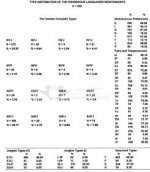Forever_Jung
Active member
- Joined
- May 23, 2009
- Messages
- 2,644
- MBTI Type
- ESFJ
It seems to me that personality type distribution can change depending on the need of society. After all, personality is fundamentally an adaptation, a specialization we make to survive and manage (as Jung describes it anyway.). I have read other old timey theorists like von Franz talk about how types didnt exist back in the day, since we could not afford to be so specialized back in the more primitive times (crude paraphrase disclaimer). Nowadays, the rationalization people always use for SJs being so common is that they are the backbone of society, we need them the most, they are practical, etc.
Is it possible that as our society had changed, as technology and the world at large continues to change at a faster and faster rate, and as the way we interact with the world has become increasingly abstract and symbolic, that intuitive types have become far more common, since their mindset is now more relevant and practical?
I know a lot of people mistype due to the shitty descriptions, I know a lot of people claim that most INFJs are actually INFP and ISFJ wannabes, and ENFPs just ESFJs with delusions of grandeur. But is it possible maybe intuitives are actually more common than everyone says? Like maybe INFJs are 5% of our population instead of 1? Don't extraverted intuitives seem fairly common to you as well?
Last month I saw a poll in a podcast group where out of 1076 people, 85% reported themselves to be intuitives types. 223 reported themselves as INFJ (20.7%), far and away the most common result. In 2nd and 3rd, ENFP and INFP were at like 12% apiece. ENFJs and INTJs were 11ish%.
The most common S type was ISFJ at 6%.The least common intuitive result was ENTP (3% of the poll). SPs and STJs made up the bottom 6 results.
I know that isn't a statistically random group (it's like a nerdy pop culture podcast), but that certainly is interesting to me.
Is it possible that as our society had changed, as technology and the world at large continues to change at a faster and faster rate, and as the way we interact with the world has become increasingly abstract and symbolic, that intuitive types have become far more common, since their mindset is now more relevant and practical?
I know a lot of people mistype due to the shitty descriptions, I know a lot of people claim that most INFJs are actually INFP and ISFJ wannabes, and ENFPs just ESFJs with delusions of grandeur. But is it possible maybe intuitives are actually more common than everyone says? Like maybe INFJs are 5% of our population instead of 1? Don't extraverted intuitives seem fairly common to you as well?
Last month I saw a poll in a podcast group where out of 1076 people, 85% reported themselves to be intuitives types. 223 reported themselves as INFJ (20.7%), far and away the most common result. In 2nd and 3rd, ENFP and INFP were at like 12% apiece. ENFJs and INTJs were 11ish%.
The most common S type was ISFJ at 6%.The least common intuitive result was ENTP (3% of the poll). SPs and STJs made up the bottom 6 results.
I know that isn't a statistically random group (it's like a nerdy pop culture podcast), but that certainly is interesting to me.



